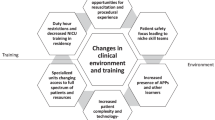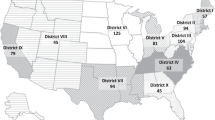Abstract
Objective:
The objectives of this study were to determine the perceived adequacy of ethics and professionalism education for neonatal–perinatal fellows in the United States, and to measure confidence of fellows and recent graduates when navigating ethical issues.
Study Design:
Neonatal–Perinatal Fellowship Directors, fellows and recent graduates were surveyed regarding the quality and type of such education during training, and perceived confidence of fellows/graduates in confronting ethical dilemmas.
Result:
Forty-six of 97 Directors (47%) and 82 of 444 fellows/graduates (18%) completed the surveys. Over 97% of respondents agreed that ethics training is ‘important/very important’. Only 63% of Directors and 37% of fellows/graduates rated ethics education as ‘excellent/very good’ (P=0.004). While 96% of Directors reported teaching of ethics, only 70% of fellows/graduates reported such teaching (P<0.001). Teaching methods and their perceived effectiveness varied widely.
Conclusion:
Training in ethics and professionalism for fellows is important, yet currently insufficient; a more standardized curriculum may be beneficial to ensure that trainees achieve competency.
This is a preview of subscription content, access via your institution
Access options
Subscribe to this journal
Receive 12 print issues and online access
$259.00 per year
only $21.58 per issue
Buy this article
- Purchase on Springer Link
- Instant access to full article PDF
Prices may be subject to local taxes which are calculated during checkout
Similar content being viewed by others
References
Sulmasy DP, Geller G, Levine DM, Faden RR . A randomized trial of ethics education for medical house officers. J Med Ethics 1993; 19: 157–163.
Hafferty F, Franks R . The hidden curriculum, ethics teaching, and the structure of medical education. Acad Med 1994; 69: 861–871.
Mattick K, Bligh J . Teaching and assessing medical ethics: where are we now? J Med Ethics 2006; 32 (3): 181–185.
Eckles R, Meslin EM, Gaffney M, Helft PR . Medical ethics education: where are we? Where should we be going? A review. Acad Med 2005; 80: 1143–1152.
Bolin J . Strategies for incorporating professional ethics education in graduate medical programs. Am J Bioeth 2006; 6: 35–36.
de Blacam C, Vercler CJ . Teaching ethics and professionalism in plastic surgery: a systematic review. Ann Plast Surg 2014; 72 (4): 484–488.
Kesselheim JC, Johnson J, Joffe S . Pediatricians’ reports of their education in ethics. Arch Pediatr Adolesc Med 2008; 162 (4): 368–373.
Accreditation Council for Graduate Medical Education. General competencies. http://acgme.org/acgmeweb/Portals/0/PDFs/commonguide/IVA5e_EducationalProgram_ACGMECompetencies_Professionalism_Explanation.pdf (accessed 30 January 2014).
Walsh Lang C, Smith PJ, Friedman Ross L . Ethics and professionalism in the pediatric curriculum: a survey of pediatric program directors. Pediatrics 2009; 124: 1143–1151.
Cook AF, Sobotka SA, Ross LF . Teaching and assessment of ethics and professionalism: a survey of pediatric program directors. Acad Pediatr 2013; 13 (6): 570–576.
Salih Z, Boyle D . Ethics education in neonatal–perinatal medicine in the United States. Semin Perinatol 2009; 33: 397–404.
Davis D, Doucet H . A curriculum for teaching clinical ethics in neonatal-perinatal medicine. Ann R Coll Physicians Surg Can 1996; 29: 45–48.
Stirrat G . Education in ethics. Clin Perinatol 2003; 30: 1–15.
Hellman J . Development of a teaching curriculum in neonatology fellowship training 2006, http://www.utoronto.ca/pgme/documents/curricula/neonatal_curr2.pdf (accessed 30 January 2014).
Daboval T, Moore GP, Rohde K, Moreau K, Ferretti E . Teaching ethics in neonatal and perinatal medicine: what is happening in Canada? Paediatr Child Health 2014; 19 (1): e6–e10.
Adam MB, Diekema DS, Mercurio MR (eds). American Academy of Pediatrics Bioethics Resident Curriculum: Case-Based Teaching Guides. http://www.aap.org/sections/bioethics/default.cfm (accessed 3 October 2014).
American Board of Pediatrics Program Directors Committee Association of Pediatric Program Directors Teaching and Assessing Professionalism: A Program Director’s Guide. American Board of Pediatrics Foundation: Chapel Hill, NC, USA, 2008, www.appd.org/professionalism.pdf (accessed 3 October 2014).
Gisondi MA, Smith-Coggins R, Harter PM, Soltysik RC, Yarnold PR . Assessment of resident professionalism using high-fidelity simulation of ethical dilemmas. Acad Emerg Med 2004; 11 (9): 931–937.
Lamiani G, Meyer EC, Browning DM, Brodsky D . Analysis of enacted difficult conversations in neonatal intensive care. J Perinatol 2009; 29 (4): 310–316.
Meyer EC, Brodsky D, Hansen AR, Lamiani G, Sellers DE, Browning DM . An interdisciplinary, family-focused approach to relational learning in neonatal intensive care. J Perinatol 2010; 31 (3): 212–219.
Antes AL, Murphy ST, Waples EP, Mumford MD, Brown RP, Connelly S et al. A meta-analysis of ethics instruction effectiveness in the sciences. Ethics Behav 2009; 19 (5): 379–402.
Daboval T, Ferretti E, Moore GP . Innovative holistic teaching in a Canadian Neonatal Perinatal Medicine Residency Program. Hastings Cent Rep 2014; 44 (6): 21–25.
American Society for Bioethics and Humanities Clinical Ethics Task Force Improving Competencies in Clinical Ethics Consultation: An Education Guide. American Society for Bioethics and Humanities: Glenview, 2009.
Acknowledgements
We thank Dara Brodsky, MD for her thoughtful review of earlier manuscript drafts, as well as the AAP Section on Perinatal Medicine groups (Trainee and Early Career Neonatologist and Organization of Neonatal Training Program Directors) for help with accessing the respective listerservs and distributing this study. We also thank Peter W. Forbes, MA for assistance with statistical analysis; this work was conducted with statistical support from Harvard Catalyst/The Harvard Clinical and Translational Science Center (National Center for Research Resources and the National Center for Advancing Translational Sciences, National Institutes of Health Award 8UL1TR000170-05 and financial contributions from Harvard University and its affiliated academic health care centers). The content is solely the responsibility of the authors and does not necessarily represent the official views of Harvard Catalyst, Harvard University and its affiliated academic health care centers, or the National Institutes of Health. No external funding was secured for this study. The authors have no financial relationships relevant to this article to disclose.
Author information
Authors and Affiliations
Corresponding author
Ethics declarations
Competing interests
The authors declare no conflict of interest.
Additional information
Supplementary Information accompanies the paper on the Journal of Perinatology website
Supplementary information
Rights and permissions
About this article
Cite this article
Cummings, C., Geis, G., Kesselheim, J. et al. Ethics and professionalism education during neonatal–perinatal fellowship training in the United States. J Perinatol 35, 875–879 (2015). https://doi.org/10.1038/jp.2015.70
Received:
Revised:
Accepted:
Published:
Issue Date:
DOI: https://doi.org/10.1038/jp.2015.70
This article is cited by
-
Fetal Cardiology Bioethics: An Innovative New Curriculum for Cardiology Trainees
Pediatric Cardiology (2024)
-
Development and validation of a tool to assess researchers’ knowledge of human subjects’ rights and their attitudes toward research ethics education in Saudi Arabia
BMC Medical Ethics (2023)
-
Uninformed Origins: Should We Be Advising Parents on the Source of Medicines and Therapies?
Health Care Analysis (2023)
-
Developing a digitally innovative ethics and professionalism curriculum for neonatal-perinatal medicine fellows: a 3-year multicenter pilot study
Journal of Perinatology (2022)



